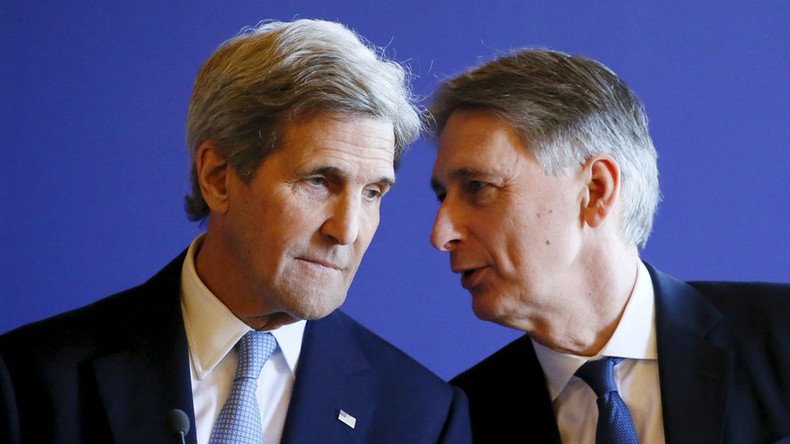Missed memo? Kerry and Hammond diverging on Russia rhetoric

For the most part, Washington and London move in lockstep in their assessments of global events and international relations. Until recently, Syria had been no exception.
On Monday, the US and Russia announced that they would work towards reviving a floundering ceasefire agreement in war-torn Syria — and in a somewhat unusual turn of events, US Secretary of State John Kerry directed some unequivocal praise towards Moscow, acknowledging that the original ceasefire would not have been made possible without Russia’s involvement.
With Moscow’s help, “literally tens of thousands of lives were saved,” he said.
This wasn’t the first time Kerry admitted that Russia had brought something of value to the diplomatic table. A month earlier, he told PBS’s Charlie Rose that Russia had “played a positive role” in bringing about the cessation of hostilities in Syria. In the same interview, he also praised Russia’s major role in bringing about the deal to rid Syria of chemical weapons, which otherwise could now be in the hands of ISIS. The Iran deal too, he said, was possible because of the “constructive role” played by Russia.
Hammond missed the memo?
Kerry’s recent efforts at diplomacy are in stark contrast to British Foreign Minister Philip Hammond’s frankly vulgar attempts to interpret Putin’s actions in Syria. Around the same time that Kerry was planning yet another trip to Moscow in March, Hammond was busy likening Vladimir Putin to “a man who beats his wife”. That crass comment was prompted by Russia’s partial drawing down of its forces in Syria — a move which Kerry had called “the best opportunity” yet to end the conflict.
It’s unclear whether Hammond thinks this kind of rhetoric makes Britain look important and influential, or whether he just has a bee in his bonnet about Putin. Realistically, it’s probably both — and he was at it again last week.
Reacting to renowned Russian conductor Valery Gergiev’s magnificent and awe-inspiring concert held in the ruins of Palmyra’s main amphitheatre last week, Hammond’s hatred for all things Russia was as unshakeable as ever. The concert, which even a New York Times writer described as “simply, starkly beautiful” was to Hammond nothing more than a “tasteless attempt” to distract from the suffering of Syrians. It showed, he said, that there were “no depths” to which the Russian “regime” would not sink.
In reality, it was Hammond’s comments which were a tasteless attempt to distract from the symbolism of the majestic event and demonstrated that there are no depths to which he personally will not sink to tarnish Russia’s image.
A columnist for Spiked Online put it best when he surmised that the reason Russia has become the power more likely to defeat ISIS was because it has a sense of what it is fighting for: history, music, culture, civilization itself. The concert “allowed a glimpse of the civilisation that it might just be worth fighting for – a sight, amid the ruins of antiquity, of the heights to which humanity can soar”.
The West, on the other hand, he wrote, talk a big game about annihilating the barbaric group, but appear to lack the deep conviction necessary to actually do much about it. “For despite their high-flown blather about the mortal threat posed by ISIS, they can’t conceive of anything about Western civilisation worth the risks Russia took.”
Unfortunately, given his recent one-liners, we might confidently assume that this level of introspection and soul-searching would go right over Hammond’s head.
Because he can
Let’s be kind and assume that a man who has risen to the position of British foreign secretary is not totally stupid. What then explains the divergence between Kerry’s most recent assessments of Russia’s role in Syria and Hammond’s?
The answer is not that complicated. Hammond uses this sort of ridiculous over-the-top rhetoric because he can — and he can because, to put it bluntly, what he says about Syria doesn’t matter that much. Britain has not played a large role in the Syrian conflict. It has fully partaken in the information war, but in the actual war? Not so much. The UK's bombing — illegal under international law — has been limited and the effects on ISIS negligible. The country has not been a major player at the negotiating table.
Hammond, therefore, can afford to blather on, lashing out with personal insults because neither he nor his Prime Minister David Cameron are among the big boys at the table when it comes to actually solving the crisis. If it were any other way, his commentary would be significantly less infantile. Where Kerry at least attempts diplomacy, Hammond sounds more like a teenager letting off some steam on his blog — choosing to spew out boorish nonsense rather than anything that could be deemed useful.
But not only are Hammond’s comments childish and stupid, they’re an unhelpful distraction. When the focus should be on working together to build a sustainable ceasefire, Hammond distracts by cracking tasteless jokes about Putin.
Don’t get too excited
Before we get carried away, it’s important to note that although he has been unusually complimentary of late, Kerry’s own comments don’t exactly signal any sort of sea change in Washington’s assessment of Russia or its role in Syria, but they do imply at least a basic level of respect. They are a diplomatic acknowledgment that yes, Russia is a crucial player in ending the Syrian conflict and that it is impossible to reach any workable solutions without Putin’s input.
In that sense, more than anything, this seeming rhetorical divergence between Washington and London serves best to illustrate Britain’s increasing irrelevance on the world stage under David Cameron. What it comes down to is that Kerry’s more measured rhetoric signifies the necessity of Russia’s role in Syria, while Hammond’s outlandish insults convey the insignificance of Britain’s.
The statements, views and opinions expressed in this column are solely those of the author and do not necessarily represent those of RT.














